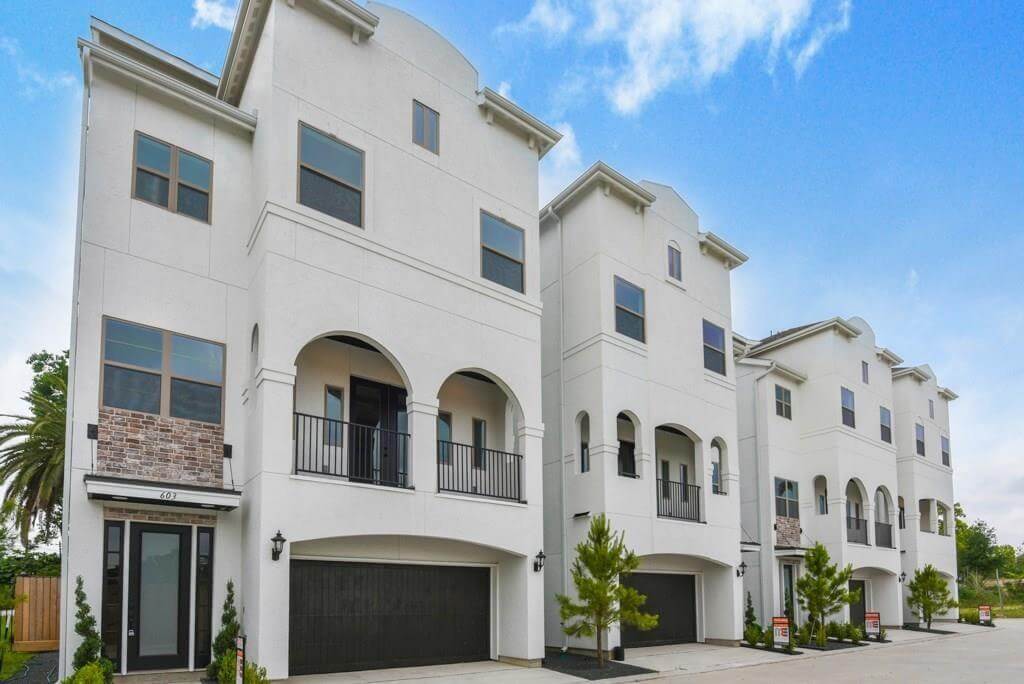Townhouses have been around for centuries, but the number of new townhouse builds has been steadily declining in recent years. In 2020, townhouses comprised 11 percent of single-family new construction, down from nearly 14% in 2008, according to an analysis from the National Association of Home Builders.
Still, townhouses can be a great option for homebuyers who enjoy living close to their neighbors.
What is a townhouse?
Townhouses are multi-floor homes that share one to two walls with adjacent properties but have their own entrances. In the suburbs, townhouses are often uniform homes built in a distinct community that may have its own homeowners association.
Newer urban townhouses may also have a uniform look and an association, but older townhouses in cities tend to be more traditional rowhomes that can stretch for city blocks with less-restrictive or no HOAs.
Townhouse vs. condo vs. apartment: What’s the difference?
If you’re trying to figure out if a townhouse is the right type of home for you, you’re likely looking at condos and apartments, too. Though there’s some overlap among these, condos are generally units in larger buildings with multiple floors and multiple units on each floor. They’re individually owned, but might also be rented to tenants. Apartments, by comparison, are strictly commercial rental units owned by a corporation, and everyone in the complex rents. Townhouses can be rented to tenants, as well, depending on the restrictions of the community.
If you’re looking for a bit more living space, a townhouse might be more appealing than a condo: They tend to have more square footage. As you compare townhouses with condos and apartments in your real estate market, consider these key differences to determine which one is a fit for your lifestyle.
Pros and cons of buying a townhouse
Pros of buying a townhome
- Cost: Because you’re sharing the walls and the footprint is smaller, townhouses are typically less expensive than single-family homes in the same area even if they have a similar square footage. You can get a lot of space close to the cities when you’re only paying for the inside of the house and not the acreage of the yard of a single-family home. It can be a cost-effective way to get more of what you want.
- Maintenance: The smaller size of a townhouse means that it requires less maintenance. If there’s an HOA, it may take care of the exterior maintenance on the property, as well.
- Amenities: Townhouses built as part of a development may include amenities such as a pool or clubhouse.
Outdoor space: Townhouses often come with access to a small amount of outdoor space or a patio and possibly a private garage.
Cons of buying a townhome
- HOA: Some people don’t like to live with the restrictions put in place by an HOA, which might include rules about what colors of paint you can use on your patio or which types of windows you’re allowed to install. HOAs also charge monthly fees, so you’ll need to factor that expense into your budget.
- Noise pollution: Since you’re in close proximity to your neighbors, you may have to deal with more noise and traffic than you would in a single-family home.
- Multi-floor living: Multi-floor living may not be sustainable for everyone. They are usually pretty vertical, It can be an issue for some older homeowners.
8 tips for buying a townhouse in 2021
1. Consider your budget
As with any home purchase, you’ll need to ensure that you can comfortably afford a townhouse before you start shopping for one. Make sure your budget includes not only the cost of the property itself but also your HOA payments, if applicable. Keep in mind that townhouses are subject to the ebb and flow of the broader real estate market, which means that prices have risen sharply over the past year. The limited supply of available inventory means that a townhouse — just like other properties — will cost more in 2021.
2. Make a must-have list for the community
You probably already know what you want from the house, in terms of bedroom size, layout and other factors. With a townhouse, it’s important to also consider what you’d like in the community, such as a community pool, a less-restrictive HOA or a security gate at the entrance.
3. Perk up your ears
Shared walls mean it may be possible to hear what’s happening in your neighbor’s house, and vice versa. When you’re checking out houses, listen carefully to see how much sound travels from next door. (If you’re able to purchase an end unit, you’ll only have to worry about half the noise.)
4. Check out the common areas
If you’re planning to use the community gym or a game room, view them before you make the purchase so you know exactly what you’re getting.
5. Talk to your future neighbors
It’s always a good idea to talk to potential neighbors when you’re considering buying a home. It’s particularly important when buying a townhouse, since you’ll be in closer proximity to them. Ask them what the vibe of the community is like, and if there are any HOA issues you should know about.
6. Read the HOA rules
Homeowners associations can restrict everything from the color of your door to whether you’re allowed to park in your own driveway (as opposed to your garage). Make sure you’re comfortable with the HOA rules — and the financial commitment — before you go ahead with a purchase in any community.
Some people want more restrictions and a more uniform look throughout the community. Some people want more freedom. The good news is that there are lots of options from different HOAs, so you can find the right one for you.
7. Think long-term
While a townhouse may make sense for you now, multi-floor living may not work for everyone and at all stages of life. If you’re planning to expand your family or are worried about your ability to traverse steps in the future, you should have a plan for whether you’ll be able to stay in the property.
8. Pay attention to interest rates
Mortgage rates have been near record lows, but they can’t stay at the bottom forever. You’ll need to think about whether to purchase your townhouse while rates remain enticingly low, and how this can affect how much townhouse you can afford if you were to wait.
Who is townhouse living best for?
Many types of homeowners can benefit from townhouses, but they’re a particularly good option for first-time homebuyers or other budget-minded homebuyers who want more space than typically afforded in a condo.
Find other housing types:
- Condominium – Condos appeal to those looking for a lower-maintenance living, home with a sense of security, opportunities to be social with neighbors, among other factors
- Townhouse – Townhouses are a particularly good option for first-time homebuyers or other budget-minded home buyers who want more space than typically afforded in a condo
- Single Family Home – Single-family homes are best for families who prefer a huge yard and plenty of room to spread out. Others still prefer a low-maintenance condo or townhome that includes benefits like landscaping, snow removal and exterior maintenance.
- Multi Family Home – Multi-family homes are best for those who are interested in getting into real estate investing and are comfortable with the added responsibility and time commitment that comes with being a landlord.
- Patio Home – Typically capped at one-and-a-half stories and part of a larger association, patio homes are best for homeowners who don’t want to deal with stairs or maintenance.
- Waterfront Home – Waterfront means the area of water which is immediately capable of use from the land, together with the area of land adjacent to the water, which is necessary to allow use of the above area of water
La Porte, Texas Townhouses For Sale
League City, Texas Townhouses For Sale
Pearland, Texas Townhouses For Sale
Spring, Texas Townhouses For Sale
Houston, Texas Townhouses For Sale
The Woodlands, Texas Townhouses For Sale
Cypress, Texas Townhouses For Sale
Katy, Texas Townhouses For Sale
Sugar Land, Texas Townhouses For Sale
Baytown, Texas Townhouses For Sale
Humble, Texas Townhouses For Sale

